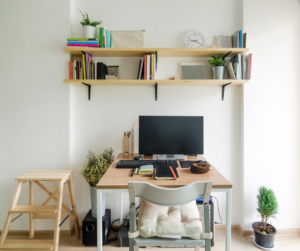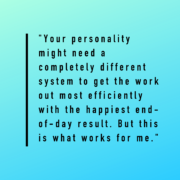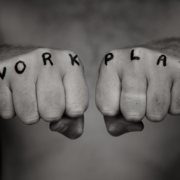You finally start your dream career, and the best part is that you are one of the lucky few who get to work from home. You wake up early, start your day energized, and get work done. After a while, your pets become your coworkers, and you watch the Office with Word Documents and digital notepads open in the background, pretending that somehow qualifies as work. You plan your week to the Tee, and as Thursday rolls around, you haven’t nearly gotten as far as you’d like. Worst of all, this week’s paycheck is going to be smaller than thought. You keep telling yourself next week will be better. You’re going to commit to your schedule and go out less, procrastinate less, and push the pedal on your projects. However, history repeats itself, and bad habits become a vicious cycle. When will you get your professional life together and give it your all? Unfortunately, laziness is something that gets to all of us working from home.
Note: This article applies to everyone working from home, no matter what job.
Here is the best advice on how to work from home and kick laziness in the butt.
Table of Contents
Pretend you have a 9-5 job.
A 9-5 job!? That’s exactly what we don’t want.
It may seem like you have so much free time to run errands, go to appointments and exercise. The reality is, if you spend your day doing other things, you’re always going to come home and put your needs first — eating, napping, showering, etc.
When you finally get to work, it will be late, and you might not be as productive as you were when running errands.
Dedicating the hours of 9-5 (or similar) to work each day helps you stay on track — schedule other activities outside of your work hours.
In short, schedule your plans around work, not the other way around.
Tell your clients when you’ll hand projects in.
Did your client not give you a deadline? Make your own and let your client know!
Telling your clients when the work will be done is like giving a promise. You can’t break it, and if you do, you will be seen as unreliable. It sounds like cutting your own head off. The trick is to set reasonable deadlines.
To set deadlines, you need to first think about how fast you can usually work. Secondly, what’s your schedule like? Do you have other projects you need to complete first? Do you have time off or personal commitments?
Once you settle how much time you need, add on an extra few hours in case something requires more time than you had originally thought.
It’s all about smart thinking. If you set your deadlines and tell your clients, you’ll be more motivated to complete the project.
Outsource work you don’t have time to do.
Whether you’re working from home or the office, work can get a little crazy. You might not find the time to get everything done, no matter how much you avoid the urge to watch Netflix or spend time on your phone.
Outsourcing some of your work may be an option to lower your workload. Here are some things you can outsource depending on the industry you work in:
- An at-home doctor/nurse can outsource medical transcription.
- Copywriters can outsource video scripts.
- Website designers can outsource logo design or the making of widgets.
- Blog owners can outsource freelance writers.
And the list goes on. You can essentially outsource anything you’d like.
Of course, outsourcing can be pricey, and you may not want to give a chunk of your income to pay other people to do a part of your job. Make sure outsourcing benefits you in the long-run before outsourcing your first project.
 Create a workspace you enjoy.
Create a workspace you enjoy.
Does your home office look like a dump? Working in a cluttered, dim, and dirty area is not going to help your productivity.
You shouldn’t be distracted by clothing on the floor, too many cups on the desk, and food stains on the keyboard. Having a workspace you look forward to working in is necessary.
Set up your office in your favorite part of your home. Buy yourself a pen holder, a cactus, a painting, and make your office feel like you. Natural light seems to help, too. Open the window curtains while working.
Creating a nice workspace may seem like a minor detail, and it can go a long way.
Get a good chair.
Getting a good chair is one of the first things to check off your list when working from home. A stool or a dining table chair may seem doable. However, you will experience discomfort after hours of sitting, and it can lead to long-term posture problems and pain.
A chair with excellent back support, adjustable heights, and armrests are what to look for.
Unfortunately, when it comes to desk chairs, cheaper is not sometimes better. The more it costs, the more support and features you will get. Think of it as an investment for your long-term well-being.
Your health comes first.
Working from home can take a toll on your health. Many self-employed people are accountable for their own hours worked. You can give a project as much time as it needs in a day, and sometimes it never ends.
You’re working on the couch in your pyjamas all day, so what’s the point of resting or taking breaks? Aren’t you already resting way more than the suckers who go to work every day?
It’s important to understand that burnout is a real problem, affecting many people working from home. Remember to pretend like it’s a 9-5 job and work 8 hours. No more.
- Here is some advice to make sure you are staying healthy while working from home:
- Don’t answer work-related calls or emails after a certain hour (7 or 8 pm).
- Take at least two full days off per week. It doesn’t matter which days, it’s the time away from work that counts.
- Be social. After working from home for a while, especially if you previously worked in an office, your social skills go down. Keep up with friends/family to save your social life.
- Make enough time to cook and eat slowly.
- Save a part of your day to exercise (outside if possible).
- Make a healthy sleeping schedule.
These tips will help your mind stay fresh when working and save energy when you’re off and enjoying your life.
Continue Reading: Struggling to work from home? Here’s what worked for me
Final thoughts.
There you have it! The recipe to working from home. Getting into the work-from-home groove can take some time. To be successful, learning self-discipline is the most crucial step. Without it, working from home can turn into a disaster — loss of income, disappointed clients or employers, and a bad toll on your health. This article offers useful advice on how to make the best out of your work-from-home life.

 WFH-copywritercollective
WFH-copywritercollective workfromhome-copywritercollective
workfromhome-copywritercollective  ParentWorking-copywritercollective
ParentWorking-copywritercollective  Home Office Solutions-copywritercollective
Home Office Solutions-copywritercollective  WorkFromHome-copywritercollective
WorkFromHome-copywritercollective  Easystretches-copywritercollective
Easystretches-copywritercollective 
 preach-copywritercollective
preach-copywritercollective